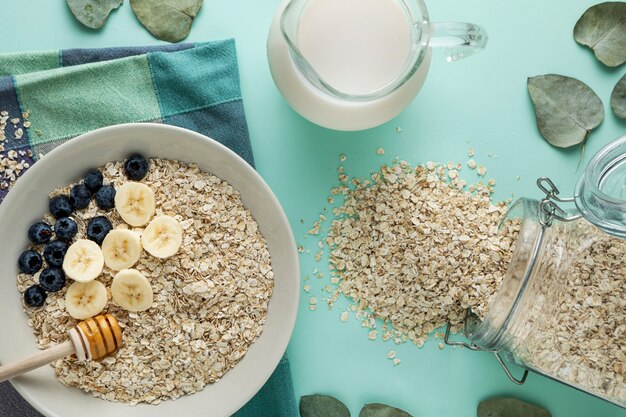
If you need a gluten-free diet—maybe you have celiac disease or feel healthier without gluten—you might wonder about oats. And it’s true, plenty of people without celiac disease also go gluten-free. Some want to lose weight, others think it helps with food intolerance, and some just feel better overall.
Did you know that from 2009 to 2014, three times as many Americans started eating gluten-free diets? But less than 1% of Americans, about 1 in 133, have celiac disease. This disease harms the small intestine, making it tough to absorb nutrients properly.
So, are oats gluten-free?
You’ll find gluten in wheat, rye, barley, and triticale. Oats, however, aren’t included here, which may be a relief for those with gluten intolerance. But there might still be concerns.
See, even if you’ve got a gluten intolerance or celiac disease, you might be wary of oats. Oats might have been grown near wheat or other gluten-containing crops, and that can cause contamination. Plus, lots of factories that process oats also handle gluten-rich foods. So, you should always check your labels and look for oats that clearly state “gluten-free.”
But there’s something else to know: oats can be troublesome even without contamination. For some people with celiac disease, a protein found in oats called avenin acts like gluten, triggering the immune system. A recent study showed that daily consumption of oats can cause avenin-sensitive immune cells to pop up in a small percentage of people.
The findings seem to suggest that most folks with celiac disease can handle small amounts of oats. If you’re thinking about giving oats a try, start slow and keep an eye out for any symptoms.
That’s a lot to think about, but don’t give up on oats just yet! They’re jam-packed with health benefits:
1. Oats are a whole grain, helping to lower the risk of heart disease and possibly stroke.
2. Rich in fiber, oats are great for digestion, can make you feel full longer, and can help manage blood sugar levels—especially beneficial for folks with diabetes.
3. Oats come with heaps of nutrients as well, including manganese, phosphorus, magnesium, copper, zinc, and even folate.
4. Oats contain antioxidants, specifically a group called avenanthramide, which can lower blood pressure.
5. Oats can lower overall cholesterol and specifically LDL-cholesterol, the “bad” kind linked to heart disease.
But oats may not work for everyone. Some diets, like certain forms of the Paleo diet, advise against oats, and people with gluten sensitivity but no celiac disease might be concerned about reactions to oats. Research suggests these reactions may not be due to oats’ gluten but rather to a group of carbs called FODMAPs which some people have difficulty digesting.
Sound tricky? Just remember, folks with celiac disease should read ingredient lists carefully and check if the product has been processed with gluten-containing ingredients. If it has, it’s better to skip it.
Here’s a sample tasty and healthy oats recipe:
Start with 1/3 cup rolled oats, and add in 1/3-1/2 cup milk or plant-based milk. Mix in 1/3 cup regular Greek yogurt (for protein), plus add a small chopped banana or 1 cup of fresh fruit. Sprinkle a teaspoon of chia seeds on top, add cinnamon to taste, and leave it all to rest overnight. In the morning, you can top your oats with your favorite nuts.
Remember: ingredient lists are key, especially for those with celiac disease and gluten sensitivities. Always check how the food was processed and avoid it if it’s been handled alongside gluten-containing ingredients.


